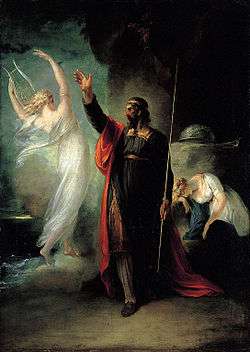Three Shakespeare Songs
| Three Shakespeare Songs | |
|---|---|
| Other name | Full Fathom Five; The Cloud-Capp'd Towers; Over Hill, Over Dale |
| Period | 20th Century |
| Genre | Classical Part song |
| Language | Early Modern English |
| Composed | June 1951 |
| Publisher | Oxford University Press |
| Duration | 7 minutes approx |
| Vocal | SATB a cappella choir |
| Premiere | |
| Date | 23 June 1951 |
| Location | Royal Festival Hall, London, UK |
| Conductor | Cecil Armstrong Gibbs |
Three Shakespeare Songs is a piece of classical choral music written for an a cappella SATB choir. It was written in 1951 by the British classical composer Ralph Vaughan Williams. The work comprises three short pieces which are settings of text from two plays by the English playwright William Shakespeare. It is published by Oxford University Press.
Composition and first performance
In 1951 the British Federation of Music Festivals (of which Vaughan Williams was president) held its annual National Competitive Festival during the Festival of Britain. The festival included a choral competition in which choirs from around the United Kingdom would demonstrate their technical abilities by performing test pieces. Vaughan Williams's associate composer, Cecil Armstrong Gibbs, tried to persuade him to compose a new test piece. Vaughan Williams was reluctant at first, and was of the opinion that the choirs should perform established test pieces rather than introducing a new composition.[1] Disappointed that Vaughan Williams had apparently failed to answer his letter, Armstrong Gibbs appeared to have given up on the idea:(this is not a reliable source)
| “ | Soon afterwards I was stricken down with some illness and was in bed when a fat envelope, registered and bearing the Dorking postmark, was brought up. Inside was the MS. (manuscript) of the Three Shakespeare Songs dedicated to me and the briefest of notes which ran: "Dear Armstrong. Here are three Shakespeare settings. Do what you like with them... Yours ever R.V.W." | ” | |
| — Cecil Armstrong Gibbs[1] | |||
The songs were premiered in the Royal Festival Hall on 23 June 1951, conducted by Armstrong Gibbs.
Harmonic style
Stylistic comparisons have been made with Vaughan Williams's Sixth Symphony which was composed only four years earlier, notably of the second song, The Cloud-Capp'd Towers. Although the published version begins in the key of F# minor, the composer's original holograph was in E minor, which is also the key of the Sixth Symphony. The shifting between E minor and E♭ minor triads, as heard on the words "shall dissolve" has been compared to the conclusion of the Epilogue movement of the symphony.[2] Vaughan Williams himself later suggested that the meaning of the symphony's last movement could be summed up in the lines from The Tempest: "We are such stuff / As dreams are made on; and our little life / Is rounded with a sleep."[3]
Texts
The text of each song is derived from plays by William Shakespeare:
Full Fathom Five
The Tempest, Act 1 scene 2:
 |
Full Fathom Five
18-second sample from Vaughan Williams's arrangement of Full Fathom Five. |
| Problems playing this file? See media help. | |
Full fathom five thy father lies,
Of his bones are coral made;
Those are pearls that were his eyes:
Nothing of him that doth fade,
But doth suffer a sea-change Into something rich and strange.
Sea-nymphs hourly ring his knell:
Ding-dong.
Hark! now I hear them, – ding-dong bell.
The Cloud-Capp'd Towers
The Tempest, Act IV scene 1
 |
The Cloud-Capp'd Towers
16-second sample from Vaughan Williams's arrangement of The Cloud-Capp'd Towers. |
| Problems playing this file? See media help. | |
The cloud-capp'd towers, the gorgeous palaces,
The solemn temples, the great globe itself,
Yea, all which it inherit, shall dissolve,
And, like this insubstantial pageant faded,
Leave not a rack behind: We are such stuff
As dreams are made on, and our little life
Is rounded with a sleep.
Over Hill, Over Dale
 |
Over hill, over dale
6-second sample from Vaughan Williams's arrangement of Over hill, over dale. |
| Problems playing this file? See media help. | |
A Midsummer Night's Dream, Act II scene 1
Over hill, over dale,
Thorough bush, thorough briar,
Over park, over pale,
Thorough flood, thorough fire
I do wander everywhere.
Swifter than the moonè's sphere;
And I serve the fairy queen,
To dew her orbs upon the green.
The cowslips tall her pensioners be;
In their gold coats spots you see;
Those be rubies, fairy favours,
In those freckles live their savours:
I must go seek some dew-drops here,
And hang a pearl in every cowslip's ear.
References
- 1 2 Kennedy, Michael; Ralph Vaughan Williams (1992). The Works of Ralph Vaughan Williams. Oxford University Press. pp. 316–7. ISBN 0-19-816330-4.
- ↑ Byron Adams, Robin Wells (2003). "The Stages of Revision of the Sixth Symphony". Vaughan Williams Essays. Ashgate Publishing. pp. 13–14. ISBN 1-85928-387-X.
- ↑ Vaughan Williams, Ursula (1964). "XIII". R.V.W. A Biography of Ralph Vaughan Williams. Oxford University Press. p. 283. ISBN 0-19-282082-6.
